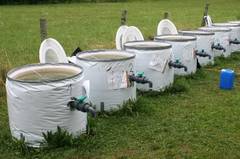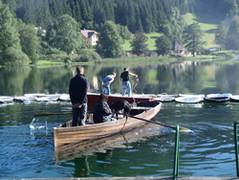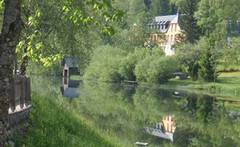In a new FWF funded project, the research group AQUA SCALE studies the role of dispersal for maintenance of diversity in plankton communities ...
The WasserCluster Lunz participated in the event „Enjoy Science“, a show-jumping course about science and research in Lower Austria at the IMC University of applied sciences in Krems from 6-7 Nov 2013. The aim of the event was to deliver students between 12 and 17 years an insight into the professional world of researchers and raise their interest in a scientific career. At the WasserCluster station, students simulated the behaviour of natural and regulated stream reaches by means of a stream model.
Streams and rivers form conspicuous networks and life therein figures among the most diverse on Earth. The common wisdom has been that biodiversity in these fluvial networks accumulates downstream similar to water and sediments. Combing sequencing with ecology, Katharina Besemer, Gabriel Singer and Tom J. Battin have now shown together with colleagues from Switzerland and the United Kingdom that this does not hold for microorganisms, which show their highest diversity in headwaters.
The "European Researchers' Night" took place in St. Pölten on 27th September 2013. During this pabn-European Event, various Research institutes, among them WasserCluster Lunz, presented their work in 300 European cities. By means of models of our different experimental stations, we explained current Research results in an informative and entertaining way. In total, 1500 People attended the event.
An international Workshop with Topic "Historical Ecology of Rivereine Fish in Europe" is taking place at WasserCluster Lunz from September 23rd to 26th.
A dedicated Group of international experts will meet to discuss recent issues in historical ecology of riverine fish and prepare a series of articles for a scientific Journal.
Andrea Funk successfully defended her PhD Thesis "Community structure, diversity and indication potential of aquatic molluscs in floodplains" at Vienna University.
We are glad that this summer we had a lot of young people again at WasserCluster Lunz who did their practical in research. These young people produced a Video which shows their work at WasserCluster Lunz. ...
Reduction of indigenous Arctic Charr populations in Lake Lunz - Research funded by the provincial government of Lower Austria allows the team of Dr. Martin Kainz to investigate effects of introduced pike on the food web structure of Lake Lunz.








